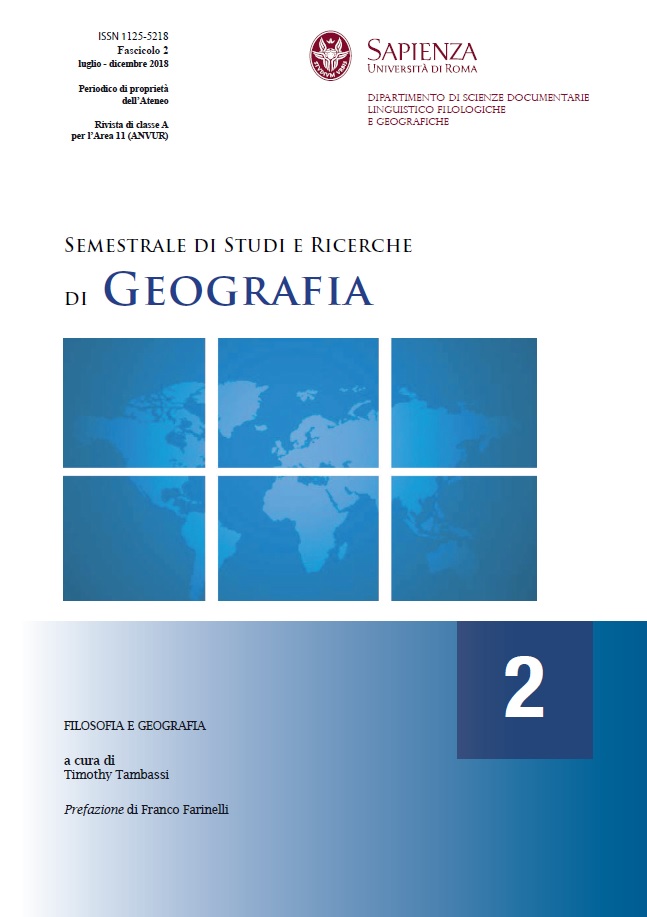Il passo del gambero
DOI:
https://doi.org/10.13133/1125-5218.14946Abstract
Crabwalk
Following on from the reading of Strabo Prolegomena, a work in which the profound link between philosophy and geography is affirmed, and from the comparison between the “Greco-Roman” geographer and the methodological and epistemological aspects contained in the main production of Friedrich Ratzel, the geographer of the State, the present work tries to demonstrate how this connection meets the political matrix which is at the base of the possibility of practicing the “explanation” of the earth, opposed to apparently neutral “descriptions”. Subsequently, according to the thesis of Foucault which states that the ownership of the exercise of power today can no longer be ascribed only to a single subject, the State, the capillarity and pervasiveness of power relations within each form of relationship must be recognized. These relationships, often not particularly visible, affect the “production” and evolution of the geographical space. Consequently, the link between power, space and knowledge must be the subject-matter of geographical reflection. For the latter, therefore, the path to be followed leads far from the mere description-measurement of the visible sphere, in order to reacquire the critical dimension in compliance with its own origins.
En crabe
Le travail compare les Prolegomena de Strabon, oeuvre dans laquelle s’affirme le lien intime entre philosophie et géographie et les aspects méthodologiques et épistémologiques contenus dans la production principale de Friedrich Ratzel, le géographe de l’État. De cette comparaison émerge un lien qui rencontre la matrice politique sur laquelle se fonde l’explication de la Terre, par opposition à des “descriptions” apparemment neutrales. Par la suite, en acceptant la thèse de Foucault selon laquelle la propriété de l’exercice du pouvoir aujourd’hui ne peut plus être attribuée à un seul sujet, l’État, nous
devons reconnaître la capillarité et l’omniprésence des rapports de pouvoir dans tout type de relation. Ces rapports, souvent peu visibles, conditionnent la “production” et l’évolution de l’espace géographique. Par conséquence, la relation entre pouvoir, espace et connaissance doit être l’objet de réflexion de la géographie. Pour la géographie, donc, le tracé à suivre conduit loin de la simple description-mesure du visible, afin de retrouver, dans le respect de ses propres origines, la dimension critique de la connaissance.
##submission.downloads##
Pubblicato
Fascicolo
Sezione
Licenza
Gli autori che pubblicano su questa rivista accettano le seguenti condizioni:- Gli autori mantengono i diritti sulla loro opera e cedono alla rivista il diritto di prima pubblicazione dell'opera, contemporaneamente licenziata sotto una Licenza Creative Commons - Attribuzione che permette ad altri di condividere l'opera indicando la paternità intellettuale e la prima pubblicazione su questa rivista.
- Gli autori possono aderire ad altri accordi di licenza non esclusiva per la distribuzione della versione dell'opera pubblicata (es. depositarla in un archivio istituzionale o pubblicarla in una monografia), a patto di indicare che la prima pubblicazione è avvenuta su questa rivista.
- Gli autori possono diffondere la loro opera online (es. in repository istituzionali o nel loro sito web) prima e durante il processo di submission, poiché può portare a scambi produttivi e aumentare le citazioni dell'opera pubblicata (Vedi The Effect of Open Access).


